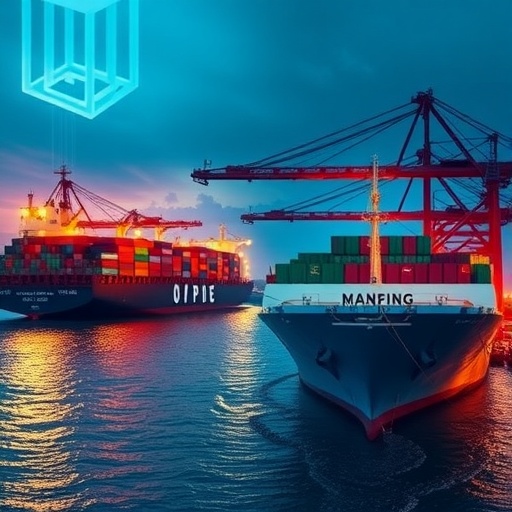In a world increasingly focused on the urgent need for sustainable practices, the shipping industry stands at a critical juncture. A recent study titled “Geopolitical risks impede global shipping decarbonization progress” highlights a conundrum that is holding back the transformative advances necessary for achieving greener maritime operations. Authored by a team of researchers led by Zhao et al., this paper sheds light on the multifaceted challenges that geopolitical tensions create, creating a ripple effect across supply chains and environmental strategies in 2025 and beyond.
The maritime shipping sector is responsible for a significant percentage of global greenhouse gas emissions. Efforts to decarbonize have been gaining momentum, with many stakeholders urging the adoption of cleaner technologies, alternative fuels, and renewable energy sources. Nevertheless, geopolitical instabilities, trade wars, and escalating international conflicts are presenting formidable barriers to these initiatives, stunting progress towards crucial environmental goals.
Complex regulatory environments further complicate the situation. As countries race to establish their own regulations on shipping emissions, the lack of a unified global framework raises questions about compliance and enforcement. This patchwork of policies can hinder investment in decarbonization technologies, as shipping companies struggle to navigate the differing requirements of each jurisdiction they operate in. Such instability not only jeopardizes investments in innovative projects but also breeds uncertainty about future compliance and operational viability.
Geopolitical tensions also affect global supply chains in intricate ways. Trade routes can be disrupted by conflicts or sanctions, creating shocks that ripple through global commerce. These disruptions force shipping companies to adopt contingency plans that may not align with long-term decarbonization goals. For instance, routes may be altered to circumvent zones of conflict, increasing fuel consumption and emissions, thereby undermining efforts to achieve a lower carbon footprint.
Moreover, the rising complexity of international relations has made collaboration between states increasingly difficult. In order to effectively address climate change, countries must recognize the interconnectedness of their economies and collaborate on sustainable shipping practices. However, geopolitical rivalry often fosters a zero-sum mentality, where national interests take precedence over collective environmental efforts. This inhibits the necessary dialogue required to forge effective arrangements that could lead to lower emissions for the shipping industry.
The research also underscores the role of public perception and stakeholder engagement in shaping the shipping industry’s response to decarbonization. In countries affected by geopolitical strife, there is often a focus on immediate security and economic concerns over long-term sustainability goals. As a result, public support for decarbonization initiatives may wane, making it difficult for leaders to pursue ambitious climate policies. A lack of engagement from stakeholders can stifle innovative solutions that align with both geopolitical and environmental goals.
The study also emphasizes the importance of technological innovation in overcoming these obstacles. Alternative fuels, such as hydrogen and biofuels, alongside advancements in energy efficiency, are critical for the industry’s transition towards sustainability. Yet, innovation in these areas often requires substantial investment, which can be stymied by geopolitical risks. Uncertainty about international relations can deter private investment, as stakeholders fear that their contributions may be wasted in a volatile political environment.
Policy coordination at an international level is highlighted as a necessity for overcoming both geopolitical and environmental challenges. Establishing clear guidelines and collaborative strategies can create a more predictable environment for businesses, which could encourage investment in greener technologies. Enhanced cooperation can also facilitate knowledge sharing, helping to fast-track the development of technologies that reduce emissions and mitigate the impacts of geopolitical risks.
As the study demonstrates, priorities in governance must shift to recognize the urgent need for action on both fronts: addressing geopolitical tensions while simultaneously pursuing aggressive environmental policies. In order to make meaningful progress toward decarbonization, policymakers must consider the intricate relationship between international stability and sustainable practices in shipping. It is not enough to pursue environmental goals in isolation; holistic approaches that encompass various dimensions of global relations are essential.
Public policy advocating for decarbonization must become intertwined with national security strategies. By recognizing that environmental degradation can exacerbate geopolitical tensions, leaders can support initiatives that not only advance sustainability but also bolster economic resilience. In this regard, the shipping industry can serve as a pivotal case study for understanding the importance of marrying climate commitments with geopolitical considerations.
Investing in adaptable and resilient supply chains is more crucial than ever. Shipping companies can leverage technology for better data analytics and forecasting to anticipate disruptions and adapt strategies in real-time. Such investments can improve operational efficiency, but they require an environment where innovation flourishes—something jeopardized by geopolitical risks.
Ultimately, the research by Zhao et al. posits that the future of shipping decarbonization hinges on a concerted effort to stabilize geopolitical landscapes. Without deliberate and strategic actions to address these issues collectively, progress towards sustainability in shipping is likely to falter. Stakeholders in the shipping industry must advocate for collaborative solutions that recognize and bridge these ideological divides, leading to a more sustainable future in maritime operations.
As we look ahead, fostering global collaboration, embracing technology, and engaging stakeholders will be central to breaking through the barriers imposed by geopolitical tensions. The road to decarbonization is undeniably complex, but recognizing these intertwined challenges presents an opportunity for collective action that could redefine the future of global shipping.
Subject of Research: Geopolitical risks and their impact on the decarbonization of global shipping.
Article Title: Geopolitical risks impede global shipping decarbonization progress.
Article References:
Zhao, P., Ma, T., Zhao, T. et al. Geopolitical risks impede global shipping decarbonization progress.
Commun Earth Environ 6, 835 (2025). https://doi.org/10.1038/s43247-025-02852-7
Image Credits: AI Generated
DOI:
Keywords: Geopolitical risks, shipping industry, decarbonization, sustainability, global trade.




